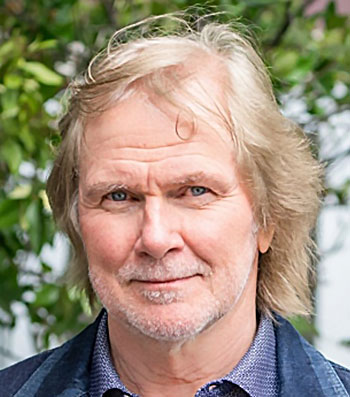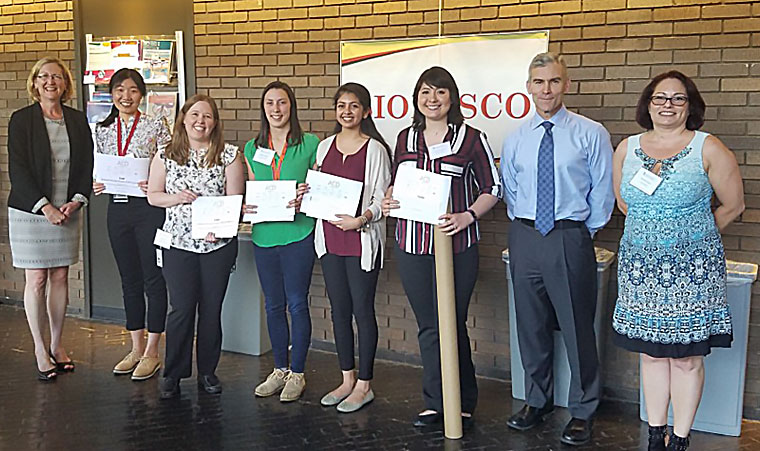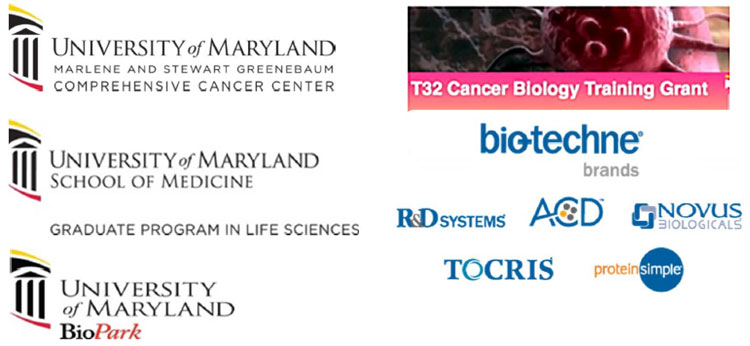Overview
About the Retreat
A Cancer Biology Research Retreat is held annually at the UMSOM. These retreats offer postdoctoral and clinical research fellows, graduate students, young investigators and faculty involved in cancer research an outstanding opportunity to to learn about the science going on at our campus, and to meet and get to know each other, the faculty and other researchers in a relaxed setting.
These goals are accomplished through oral presentations by distinguished guest speakers, fellows and students, and poster presentations. Trainee posters and platform talks are judged by faculty for cash awards.
10th Annual Cancer Biology Retreat
The 10th Annual Cancer Biology Research Retreat, was held on June 12, 2019 on the UMB campus in the newly renovated Leadership Hall and the surrounding MSTF Atrium.
The retreat was planned and organized by the Cancer Biology T32 trainees with the assistance of faculty, Dr. Michele Vitolo, Dr. Toni Antalis, and Dr. Pavlos Anastasiadis. The program included poster presentations by postdoctoral basic researchers and clinical fellows, and graduate students.
The Cancer Biology Research Retreat was a great success with over 150 registrants (25% graduate students, 12% postdoctoral fellows, 33% other researchers, students, and interns, and 30% faculty).
Keynote Speakers

Frank McCormick, Ph.D., FRS, DSc (Hon)
Professor,
UCSF Helen Diller Family Comprehensive Cancer Center
"New approaches to targeting Ras"

Matthew D. Hall, PhD
Branch Chief and Group Leader,
NCATS Chemical Genomics Center at the National Center for Advancing Translational Science, National Institutes of Health (NIH)
"Assays to lead the way: Approaches to cancer therapeutic discovery"
For more information regarding our keynote speakers, please click the Keynote Speakers tab above
Career Panel
We also held a Career Panel which highlighted some of the different career paths for our graduate students and postdoctoral fellows. The panel discussed the journey to their current careers, what they do in their roles, and also answered questions from the audience. Our panel consisted of several of our Molecular Medicine Cancer Track Alumni:
Amanda Boggs, PhD
AAAS Science and Technology Policy Fellow,
U.S. Department of State, Bureau of African Affairs
Jessica Brusgard, PhD
Biomedical Life Scientist, Leidos
Emily Cheng, PhD
Principal Research Scientist, Battelle Memorial Institute
Kathryn H. Driesbaugh, PhD
Program Director, Coriell Institute for Medical Research
Marey Shriver, PhD
Director, Office of Research Career Development
University of Maryland School of Medicine
Jim Steinhardt, PhD
Scientist I, Antibody Discovery and Protein Engineering,
AstraZeneca
Poster Presentation Winners
Outstanding Poster Presentation Winners
Predoctoral Poster:
1st Place: Lena McLaughlin
2nd Place: Rachel O'Neill and Nisha Pawar
Postdoctoral Poster:
1st Place: Rachel Lee, PhD
2nd Place: Christina Paluskievicz, PhD
3rd Place: Li Pan, PhD
Prizes:
1st Place: $50 gift card & $1000 toward a purchase from Advanced Cell Diagnostics, Inc.
2nd Place: $50 gift card and $800 toward a purchase from Advanced Cell Diagnostics, Inc.
3rd Place: $50 gift card and $500 toward a purchase from Advanced Cell Diagnostics, Inc.

(left to right) Nancy Cowger, PhD (Director, Technology Licensing, OTT), Li Pan, PhD, Rachel Lee, PhD, Rachel O'Neill, Nisha Pawar, Lena McLaughlin, Phil Robilotto, DO, MBA (Associate Vice President, OTT), Michele Vitolo, PhD
Organizing Committee
Cancer Biology Research Retreat Organizing Committee
- Nisha Pawar
- Michael Kessler, PhD
- Sivaveera Kandasamy, MBBS
- Pavlos Anastasiadis, PhD
- Cheryl Armstrong, PhD
- Blake Moses, PhD
- Eleanor Ory, PhD
- Christina Paluskievicz, PhD
- Ryan Richardson, PhD
- Michele Vitolo, PhD, Faculty Advisor
- Toni Antalis, PhD, Faculty Advisor
- Jennifer Aumiller, MEd, Director, GPILS/OPS Career and Professional Development and Office of
Postdoctoral Scholars - Renee Cockerham, PhD, Program Manager, GPILS/OPS Career and Professional Development
and Office of Postdoctoral Scholars - Chelsea Rosenberger, Academic Services Specialist, Molecular Medicine Program, GPILS
- Leanne Simington, UMGCCC Contract and Grants Coordinator
Sponsors
Keynote Speakers
Keynote Speakers

Frank McCormick, PhD, FRS, DSc (Hon)
Dr. Frank McCormick, is a Professor at the UCSF Helen Diller Family Comprehensive Cancer Center. Prior to joining the UCSF faculty, Dr. McCormick pursued cancer‐related work with several Bay Area biotechnology firms and held positions with Cetus Corporation (Director of Molecular Biology, 1981‐1990; Vice President of Research, 1990‐1991) and Chiron Corporation, where he was Vice President of Research. In 1992 he founded Onyx Pharmaceuticals, a company dedicated to developing new cancer therapies, and served as its Chief Scientific Officer until 1996.
At Onyx Pharmaceuticals, he initiated drug discovery efforts that led to the approval of Sorafenib in 2005 for treatment of renal cell cancer, and for liver cancer in 2007, and the approval of ONYX‐015 in 2006 in China for treatment of nasopharyngeal cancer. In addition, Dr. McCormick’s group led to the identification of the CDK4 kinase inhibitor, Palbociclib, approved for treating advanced breast cancer. Dr. McCormick's current research interests center on ways of targeting Ras proteins and their regulators, including the NF1 protein neurofibromin.
Dr. McCormick holds the David A. Wood Chair of Tumor Biology and Cancer Research at UCSF. He is the author of over 330 scientific publications and holds more than 20 issued patents. He was Director of the Helen Diller Family Comprehensive Cancer Center from 1997 to 2014. He also served as President, 2012‐ 2013, for the American Association for Cancer Research. Since 2013, Dr. McCormick has led the National Cancer Institute’s Ras Initiative at the Frederick National Laboratories for Cancer Research overseeing the national effort to develop therapies against Ras‐driven cancers. These cancers include most pancreatic cancers, and many colorectal and lung cancers, and are amongst the most difficult cancers to treat.
Dr. McCormick is a Fellow of the Royal Society and a member of the National Academy of Sciences.

Matthew D. Hall, PhD
Dr. Matthew Hall is currently a Branch Chief for the NCATS Chemical Genomics Center, National Center for Advancing Translational Sciences (NCATS), National Institutes of Health’s (NIH) in Rockville, Md., and he also serves as biology group leader there. Hall, who joined NCATS in 2015, leads a team of biologists who develop and optimize both biochemical and cell-based assays for automate, small-molecule, high-throughput screening in collaboration with NIH intramural and extramural partners.
He is currently co-chair of the National Cancer Institute’s (NCI) Chemical Biology Consortium. Hall’s research portfolio has an emphasis on oncology, but he also covers a diverse range of other human pathologies and diseases.
Dr. Hall received his B.Sc. (Hons) and Ph.D. in the School of Chemistry at the University of Sydney, in the laboratory of Professor Trevor W. Hambley. His doctoral work included six months in the Nuffield Division of Clinical Laboratory Sciences at Oxford University. After a year working under Valeria Culotta at Johns Hopkins Bloomberg School of Public Health under an American Australian Association Sir Keith Murdoch Fellowship studying metal transporters, Dr. Hall moved to the NCI Laboratory of Cell Biology under Michael M. Gottesman.
At NCI, Dr. Hall used his chemical and genetic experience to work on the experimental therapeutics, the clinically challenging phenomenon of cancer multidrug resistance, and developed models for studying drug penetration across the blood-brain barrier.


